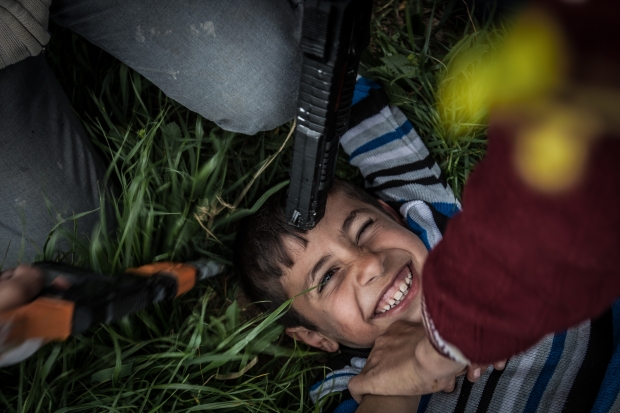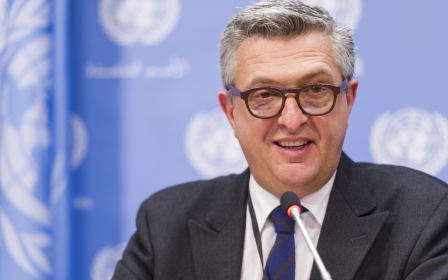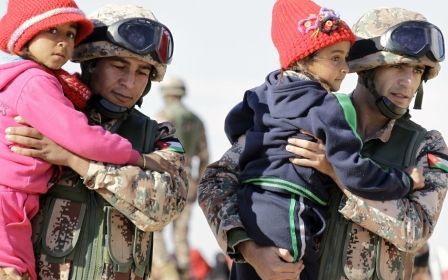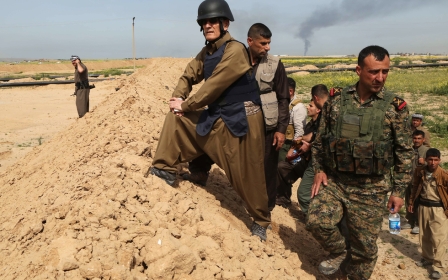The camp that became a city: Syrians build new lives in northern Iraq
DARASHAKRAN, Iraq - Inside the tiny bakery, the oven is still cold but the bread dough is almost ready. Two of Mehdi Aziz Abu’s nine children now live in Germany, but the 58-year-old Syrian baker decided to stay close to his war-torn homeland.
“It’s a real bakery, the exact same one we had in Syria,” Abu proudly said, adding that he felt “comfortable being in a city where everyone is Syrian”.
Next door, Leila Ali, 20, watches Kurdish soaps on her TV set as she waits for the village to wake up and the first customers to arrive in her baklava shop. “When I work I feel like I am in Syria,” she said with a smile.
The Darashakran camp opened on 1 October 2013 and is now home to nearly 11,000 Syrian refugees, mainly coming from the northeastern Syrian town of Qamishli. It is labelled by the Kurdistan Regional Government (KRG) as one of Erbil’s four “permanent camps”.
The semi-autonomous Kurdish region of Iraq, which houses around 97 percent of the 245,000 Syrian refugees who fled to Iraq, has opened nine camps in the five years since the war began.
As Syria enters a sixth year of war, some of these sites have developed radically. Brick houses have since replaced the UN-provided white tents while the fight to survive seems to have turned into a desire to rebuild.
“The government provided tents that were not good enough for the people to live in. But the refugees worked and, with their own money, bought blocks and started to build,” Karwan Jalal, a civil engineer working for the General Directorate of Water and Sewage, told Middle East Eye.
Next to the government’s yellow excavator, a group of kids play their new favorite game: PKK and Peshmerga forces against IS militants.
“Allahu Akbar,” shouts one of them as he presses his plastic gun to a friend’s forehead. Metres away from the battlefield, two teens armed with a wheelbarrow come and go, loaded with construction material. They want to expand their home.
Jalal, who works in camps to set up waste water systems, estimates that about 50 percent of Darashakran’s urban development has been led by the refugees themselves.
“I am sure it will become a city and grow,” the engineer added.
According to Hayman Hawar, who manages the camp on behalf of the KRG in collaboration with the Danish Refugee Council (DRC), the camp’s development started when it became too dangerous for refugees to stay in tents when some were burned down by fire.
In addition to the refugees’ will to live in a more sustainable environment, the construction frenzy has started generating economic development as well.
On the main commercial street, dozens of shops now sell everything from wedding dresses and lingerie to chicken shawarma and ice cream.
“The majority of refugees want to work. That’s why they started opening shops,” Hawar told MEE. “This camp is already like a small city,” he said.
Decision-making structure
As Darashakran became more than just a temporary shelter, groups of refugees started collaborating with the authorities with the aim of being part of the decision-making structure inside the camp.
Dris Shukur, 42, is the president of what he and his 12 colleagues – all volunteers - call the “council,” which he said aims to represent the refugees’ interests and voice their concerns.
“When we immigrated here, there were difficulties to connect directly with the organisations and the people living in the neighborhood,” Shukur, who was among the first refugees to arrive in Darashakran, told MEE.
“Our mission is to communicate with the government and the humanitarian organisations to solve the camp’s problems and to fulfil [the refugees’] needs,” he said.
Jozef Merkx, the United Nations High Commissioner for Refugees (UNHCR) coordinator for the Kurdish region of Iraq, said he supported “as much as possible” this kind of initiative.
“It definitely helps to make camps more sustainable because people will feel they can participate and take initiatives to improve their living conditions in the camp,” he told MEE.
According to Massoud Mohammed Youssef, 41, one of the 13 representatives, the council is divided into sub-groups handling various issues such as education and health.
Youssef, who lives with his wife and a four-year-old son who has never known Syria at peace, said that like many Syrians he had built his house by himself.
“Refugees need to rely on themselves, not only on the help of foundations,” he said.
“If you have an issue you can go see them and they will solve your problems, I believe it’s really nice to have them,” Aras Mahmoud, a 21-year-old break-dancer with a grey cap pulled down over his shorst black hair, told MEE.
Youssef, who used to be the council’s “president,” said that the refugees’ main concerns included the shortage of food supplies and the lack of work opportunities for Syrians.
The KRG grants Syrian refugees the right to move freely, enroll in public schools and work legally in the region if they have residency permits.
Located an hour’s drive from Erbil, refugees living in Darashakran are allowed to go to the city to look for work, but many say they actually have no access to the job market.
'We are Syrians'
“There are no jobs at all, we are just sitting at home with not enough food,” said Jinin Ramadan, a 20-year-old mother of four who has been living in Darashakran for almost a year and a half.
“If we had enough money, we would go to Europe like everyone else,” she said. On top of a difficult financial situation, Ramadan said she was concerned that her 12-day-old baby, who was born in the camp, would not get a proper ID.
“I’m upset that he was born in Iraq because if we go back to Syria the government will ask us why we left and why he is not registered. They will ask me if I was with the resistance or the regime,” Ziyad Sulaiman, Jinin’s husband, told MEE. But “he is Syrian because we are Syrians,” the mother insisted.
In this city-like camp where some are born and others buried in a cemetery near the trench that was dug to prevent car bomb attacks, the population is foreseeing its stay rather than its departure.
That includes concerns about the camp’s political institutions. If the leader of the so-called “council” is elected by his peers, some refugees have questioned why the representatives themselves are not.
Aras Mahmoud, who spent most of his life in a country ruled by an authoritarian regime, said he did not question the work being done by members of the council but rather challenged their legitimacy to do so.
“We want to have elections,” Mahmoud said. “I want to be able to cast my vote. The population of the camp has to choose,” he added, wondering what would prevent “two or three” of those representatives from one day becoming “dictators".
“We try to organise elections to make sure refugees do participate in local committees,” Merkx said.
The UNHCR representative also added that talks were ongoing with Kurdish authorities to support a transition between closed camps to “more sustainable settlements or suburbs” in areas where Syrian families had established themselves.
“Hopefully, they will become like small villages,” he said.
Mahmoud, who fled Syria at the very beginning of the uprising, said he was one of the last members of his break dancing team who hadn’t fled to Europe.
The young artist said he planned on staying in Darashakran. “With what’s happening in Syria, life cannot stop here. It's true that we are now in a bad situation, but we will continue to live,” he said.
New MEE newsletter: Jerusalem Dispatch
Sign up to get the latest insights and analysis on Israel-Palestine, alongside Turkey Unpacked and other MEE newsletters
Middle East Eye delivers independent and unrivalled coverage and analysis of the Middle East, North Africa and beyond. To learn more about republishing this content and the associated fees, please fill out this form. More about MEE can be found here.





